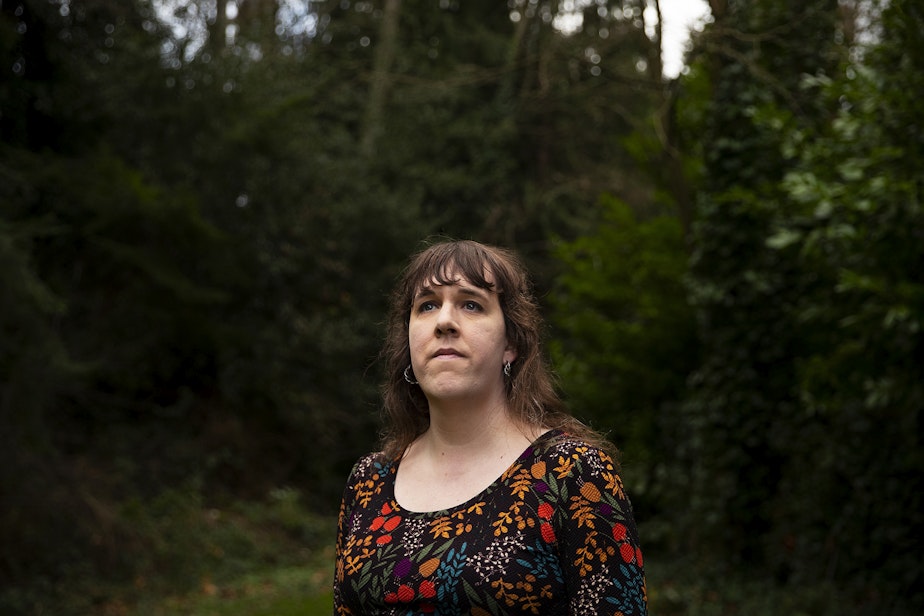With Trump returning, some trans folks prepare to move to Washington state, or another country

Twenty-seven-year-old Virgil was living in Nashville when, a couple of years ago, the state Legislature proposed bills that “together make it very difficult to be trans in public,” Virgil said. “That was kind of the turning point.”
Virgil and his partner borrowed and scraped together the money they needed for moving expenses, and they now live with five roommates in a house in Federal Way. Virgil asked that KUOW not publish his last name because he’s worried about anti-trans backlash.
“Safety, of course, was our first priority, but we also wanted to live somewhere that’s nice to live, and I’ve always just loved the Pacific Northwest,” Virgil said.
But now, just two years after they arrived, Virgil and his partner aren’t sure they’ll be safe here anymore either, and they’re preparing to potentially leave the country.
“I don’t want to leave the country,” said Virgil, who was born in Tennessee. “I was raised here. I would consider myself a pretty patriotic person. Both of my parents were veterans. So it is very sad.”
Sponsored
Virgil is one of many transgender people who are worried about what President-elect Donald Trump’s incoming administration means for them. Trump’s campaign promises include asking Congress to make gender-affirming care of children illegal, and ending all federal funding (such as through Medicare and Medicaid) for gender-affirming care for adults. He also promised to ask Congress to declare that there are only two genders — male and female — and they are assigned at birth, and to use Title IX to ensure that transgender women cannot compete on women’s sports teams.
As for same-sex marriage, some in the LGBTQ+ community are worried that, because that was a right granted by the Supreme Court, the current court, which has a conservative supermajority, could decide to rescind it. Justice Clarence Thomas wrote in his concurring opinion in the case that overturned Roe v. Wade that the justices should revisit same-sex marriage.
After the November election, Seattle’s LGBTQ+ Center filled with people looking for a place to process.
“We saw quite a few folks coming in, not only just to speak about their fears, but also just to have a space to be,” said Nakita Venus, the Center’s executive director.
Washington is known as a progressive state for trangender rights. During the last Trump administration, Washington’s governor-elect Bob Ferguson led lawsuits to defend those rights when Ferguson was serving as the state’s attorney general. But still, Venus said people are worried about the possibility of new restrictions on gender-affirming care, the end of same-sex marriage, and the loss of the non-binary “X” marker on official IDs.
Sponsored
To prepare, some people are trying to expedite name changes and gender-affirming health care; some are filing paperwork to give their partners durable power of attorney in case same-sex marriage is overturned; and some are making painful decisions about whether it would be safer to change the “X” on their IDs to either “M” or “F.”
Venus said they’ve also heard from a lot of people who are looking to move to Washington from more conservative states.
“That was something we had already been experiencing,” they said. “We can just anticipate that that’s going to happen more after January.”
Venus said people moving to the state often need resources — help finding housing and jobs, and assistance paying for moving expenses, food, and medical care.
Others, who are already here, are worried Washington won’t be able to protect them from federal policy shifts.
Sponsored
That’s why Virgil and his partner are preparing for a move to Mexico, since Virgil believes his company could transfer him there to continue his job doing maintenance on conveyance equipment, and he could get a four-year work visa. Virgil’s partner is working on getting an updated copy of her birth certificate, with her chosen name, and then they plan to get passports.
“There are several things that would be a trigger point for us,” Virgil said. “If there was federal removal of transgender protections and rights — something like that being proposed would be an immediate trigger moment: grab your bags and get gone.”

Callie Harden-Andersson, who lives with her wife in Everett, is also bracing herself for the incoming presidential administration.
Before she realized she was trans, Harden-Andersson said, “I felt really inert. I wasn’t really connected to my emotions. Living life just kind of felt like a dream most of the time.”
Sponsored
After starting hormone therapy — blocking testosterone and adding estrogen — “all my emotions began to open up,” Harden-Andersson said. “I suddenly felt things and was able to empathize with people more. It feels like my body is meant to be this way.”
That’s why her biggest concern is that the Trump administration would make it more difficult, or impossible, for her to get hormones.
“There are a lot of ways a Republican administration can go after them,” she said. “They could ban it completely. They could cut funding or not require insurance to cover it. Or they could just go back to the old models, which is a lot of gatekeeping.”
Harden-Andersson said leaving the U.S. is not off the table for her and her wife.
“I don’t want to be doomer about it and say it’s definitely going to happen, but you also have to be realistic and consider what signs you are going to look for when it’s too bad, and you should make plans to be elsewhere,” she said.
Sponsored
If federal law were changed to make it easier to arrest trans people, Harden-Andersson said she’d consider leaving.
“I hope Washington will continue to be a good state, but I’m definitely scared of the future,” she said. “If the Republicans decide to make national changes, I don’t know how much Washington can shield us from that.”
Back at Seattle’s LGBTQ+ Center, Nakita Venus said they plan to keep fighting for their community.
“We know what it means to take care of our community, but it doesn’t mean it is not exhausting,” Venus said. “I feel that to my bones — the exhaustion.”




